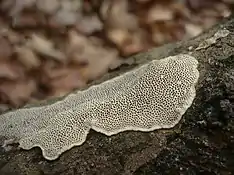Datronia
Datronia is a genus of poroid crust fungi in the family Polyporaceae. The genus was circumscribed by Marinus Anton Donk in 1966, with Datronia mollis as the type species. Datronia fungi cause a white rot in hardwoods. Datronia contains six species found in northern temperate areas.[1] The most recent addition, Datronia ustulatiligna, was described in 2015 from Himachal Pradesh in India.[2]
| Datronia | |
|---|---|
 | |
| Datronia mollis | |
| Scientific classification | |
| Kingdom: | |
| Division: | |
| Class: | |
| Order: | |
| Family: | |
| Genus: | Datronia Donk (1966) |
| Type species | |
| Datronia mollis (Sommerf.) Donk (1966) | |
Taxonomy
Datronia was circumscribed by Dutch mycologist Marinus Anton Donk in 1966 to contain two species, the type, Datronia mollis, and D. epilobii. Donk explained that the genus description was abbreviated, as his intention was only to validly publish the genus, and that several contemporary authors had already accepted the name.[3]
Datronia is in the core polyporoid clade, a phylogenetic grouping of species first identified by Binder and colleagues in 2005. The clade contains many of the genera traditionally associated with the families Polyporaceae and Ganodermataceae.[4][5] Within the core polyporoid clade, it is part of the polyporus clade, which includes the polyphyletic genus Polyporus, as well as the genera Cryptoporus, Daedaleopsis, Earliella, Megasporoporia, and Microporus.[6] In 2014, Datronia scutellata was transferred to the new genus Datroniella when molecular analysis showed that it was not closely related to D. mollis and D. stereoides.[7]
Species
- Datronia decipiens (Bres.) Ryvarden (1988)[8]
- Datronia glabra Ryvarden (1987)[9] – Venezuela
- Datronia mollis (Sommerf.) Donk (1966)[3]
- Datronia orcomanta Robledo & Rajchenb. (2006)[10] – Argentina
- Datronia parvispora Ryvarden (2014)[11]
- Datronia perstrata (Corner) T.Hatt. & Sotome (2013)[12] – Asia
- Datronia sajanensis (Parmasto) Domanski (1974)[13]
- Datronia sepiicolor (Corner) T.Hatt. & Sotome (2013)[12] – Asia
- Datronia stereoides (Fr.) Ryvarden (1968)[14]
References
- Kirk, P.M.; Cannon P.F.; Minter, D.W.; Stalpers, J.A. (2008). Dictionary of the Fungi (10th ed.). Wallingford, UK: CAB International. p. 195. ISBN 978-0-85199-826-8.
- Kaur, Harpreet; Kaur, Gurpreet; Dhingra, G.S. (2015). "Datronia ustulatiligna sp. nov. (Agaricomycetes) from India". Mycotaxon. 130: 295–297. doi:10.5248/130.295.
- Donk, M.A. (1966). "Notes on European polypores – I". Persoonia. 4 (3): 337–343. PMID 4262222.
- Binder, Manfred; Hibbett, David S.; Larsson, Karl-Henrik; Larsson, Ellen; Langer, Ewald; Langer, Gitta (2005). "The phylogenetic distribution of resupinate forms across the major clades of mushroom-forming fungi (Homobasidiomycetes)". Systematics and Biodiversity. 3 (2): 113–157. doi:10.1017/S1477200005001623. S2CID 13102957.
- Sotome, Kozue; Hattori, Tsutomu; Ota, Yuko; To-anun, Chaiwa; Salleh, Baharuddin; Kakishima, Makoto (2008). "Phylogenetic relationships of Polyporus and morphologically allied genera". Mycologia. 100 (4): 603–615. doi:10.3852/07-191R. PMID 18833753. S2CID 22100239.
- Justo, Alfredo; Hibbett, David (2011). "Phylogenetic classification of Trametes (Basidiomycota, Polyporales) based on a five-marker dataset". Taxon. 60 (6): 1567–1583. doi:10.1002/tax.606003.
- Li, H.J.; Cui, B.K.; Dai, Y.C. (2014). "Taxonomy and multi-gene phylogeny of Datronia (Polyporales, Basidiomycota)". Persoonia. 32: 170–182. doi:10.3767/003158514X681828. PMC 4150076. PMID 25264389.
- Ryvarden, Leif (1988). "Type studies in the Polyporaceae. 20. Species described by G. Bresadola". Mycotaxon. 33: 303–327.
- Ryvarden, Leif (1987). "New and noteworthy polypores from tropical America". Mycotaxon. 28 (2): 525–541.
- Robledo, G.; Urcelay, C.; Domínguez, L.; Rajchenberg, M. (2006). "Taxonomy, ecology, and biogeography of polypores (Basidiomycetes) from Argentinian Polylepis woodlands". Canadian Journal of Botany. 84 (10): 1561–1572. doi:10.1139/b06-109. hdl:11336/31093.
- Ryvarden, Leif (2014). "Studies in Neotropical polypores 37. Some new and interesting species from tropical America". Synopsis Fungorum. 32: 58–67.
- Hattori, Tsutomu; Sotome, Kozue (2013). "Type studies of the polypores described by E.J.H. Corner from Asia and West Pacific Areas VIII. Species described in Trametes (2)". Mycoscience. 54 (4): 297–308. doi:10.1016/j.myc.2012.10.008.
- Domanski, S. (1974). "Mala flora grzybów. Tom I: Basidiomycetes (Podstawczaki), Aphyllophorales (Bezblaszkowe). Bondarzewiaceae, Fistulinaceae, Ganodermataceae, Polyporaceae" (in Polish). 1: 196.
{{cite journal}}: Cite journal requires|journal=(help) - Ryvarden, Leif (1968). Flora over kjuker. Oslo: Universitetsforlaget. p. 42. ISBN 978-8200021339.